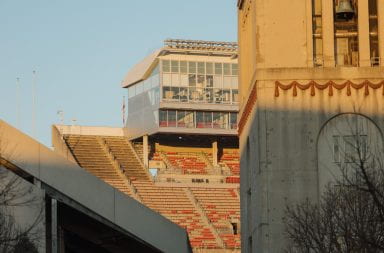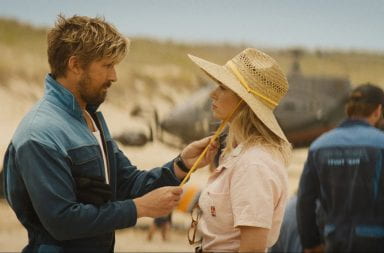At the start of spring break two weeks ago, seven students, members of Ohio State’s Engineers Without Borders, got on an airplane and flew south. They weren’t headed for Cancun.
They landed at Comalapa International Airport outside the capital city of El Salvador. The group, including a professional mentor and a Peace Corps volunteer, crowded into a cramped van that rolled across the hilly countryside to San Pedro Puxtla, a town in the west of the Central American country.
OSU’s Engineers Without Borders had worked with the central Ohio professional branch of their organization to design special latrines that would improve sanitation in an impoverished part of the town called Las Pilitas.
Now they would spend their spring break building these latrines.
They first noticed the chickens.
“All of the animals kind of roam about,” group member Sarah Koop said. As the van puttered down the main thoroughfare of the town, she said they saw dogs and horses, and even a bull being led down the street, somewhat against its will.
The Las Pilitas neighborhood where they began working the next morning is situated in a ravine, said Katie Zorc, president of the group. The road from San Pedro Puxtla unexpectedly drops off, overlooking the houses of the community below.
“It’s really abrupt, and you see it and are like, ‘Wow, people live down there?'” Zorc said.
The sight confirmed everything she had heard about how isolated the neighborhood was from the rest of the town.
Accompanied by translators, the group held a meeting with members of the neighborhood in the yard of a local man named Noe (pronounced No-Ay). He owns a little snack shop and is also the secretary of the community council. His front yard, one of the sites where a latrine would be built, is also a gathering place for the community, Zorc said.
“It became our base,” group member Amanda Kauppila said.
The pits had already been dug before the group arrived. So for the next few days, almost all of their time was spent cutting long steel bars into smaller pieces for reinforcement. The only tools they had were hacksaws powered not by electricity but by their own determination.
After nearly a full eight-hour workday, the first thing the group wanted to do was shower. Then eat. Then sleep.
“We were wiped out after the first day,” Koop said.
The heat was their enemy. Temperatures during the day neared 100 all week, and just standing around would leave them drenched, Zorc said.
“You’d be taking a shower and sweating at the same time,” Koop said laughing.
The shower consisted of a 45-gallon drum full of water and a bucket, added Eric Richards, vice president of the group. The town only has running water on certain days, so people store water for the rest of the week.
They stayed with host families in the town proper of San Pedro Puxtla. Carmencita had hosted Peace Corps volunteers before, and her young son Eric, with his 7-year-old vocabulary, helped some of the members pick up some Spanish. He was a persistent, but welcome, tag-along.
Across the street, the others stayed with Maricruz, a local woman who owned a small restaurant and provided the group with meals.
Koop said she learned things from the townspeople she couldn’t have found in any engineering textbook.
One day, while working on the structures for the latrines, the group was struggling to come up with a way to make a mold. Jose, the president of the community council who was also working with them, raced home and came back with a strip of roofing sheet metal that he then bent into shape, she said.
They passed time in the town square. Small groups of children, curious about the town’s newcomers, were always nearby.
“Wherever we’d go, in five minutes, there would be a bunch of kids following us,” Zorc said. They entertained them with hand-clapping games. The teenagers, more skeptical, would lurk on the outskirts of the group.
Once after a hard day’s work, they climbed to the top of the tallest hill to watch the sunset. Struggling to put one foot in front of the other, as the slope became almost vertical, Koop said she saw local women lugging huge jugs of water hurrying past them.
There were challenges, both from the lack of a shared language and from the sheer hard work.
One afternoon they were working to level out the uneven bottom of one of the pits.
“You get in the hole, and it’s like right in the middle of the day,” Richards said. “It’s 105 degrees. You’re standing there with a pickaxe, and it’s almost rock-hard clay. You’re hitting for an hour and you get 6 inches dug.”
The translators weren’t around, so they had to resort to gestures, which were not entirely successfully, before they got the measurements right.
The night before they left, they met once again in Noe’s front yard for a discussion about what would happen after the group left.
At the meeting, the community decided to build three more latrines.
The students agreed to send supplies but would have to raise the money first.
“That night, we were sad,” Zorc said. Along with the three latrines that were nearly completed, they had built friendships with many of the locals.
“We developed a bond with them. We weren’t ready to leave,” Koop said.
The people of Las Pilitas don’t have computers or e-mail to keep in touch, Zorc said. They can’t update their Facebook statuses.
“It’s a different world,” Zorc said. “The only way to be in it is to be there.”
OSU’s Engineers Without Borders is hosting a dodgeball game at the RPAC April 30 to raise money for the group. The cost will be $5 per person with a team of at least five. The money will be spent on supplies and travel expenses, the group said. They hope to visit San Pedro Puxtla again in September. To learn more, visit the group’s Web site, ewb.osu.edu.


